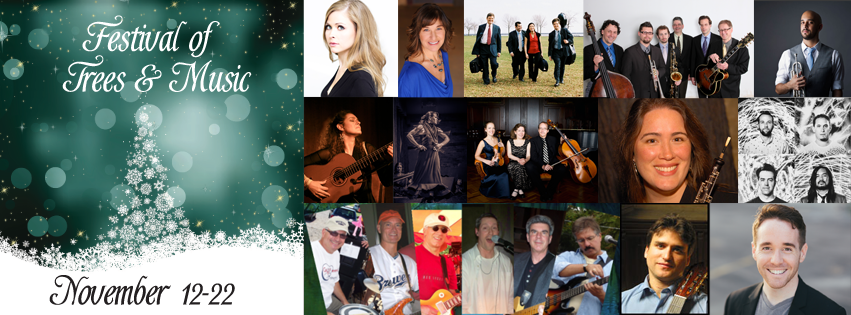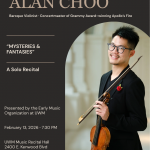Joys and Sorrows of Chamber Music
Conservatory’s festival offered wonderful playing by Prometheus Trio and Philomusica Quartet

Festival of Trees and Music: Eleven Evenings of Music and Art. Photo from The Wisconsin Conservatory of Music Facebook page.
The Wisconsin Conservatory of Music has been hosting the “Festival of Trees and Music: Eleven Evenings of Music and Art,” which will continue through November 22. On Monday, it was a pleasure to hear the Philomusica String Quartet with guest pianist Elena Abend. Tuesday evening featured the Prometheus Trio with guest oboist Margaret Butler.
It is refreshing to hear a composition by Dmitri Shostakovich that doesn’t make you feel like draining a vein. Shostakovich’s music can be stark, desperate, cold, and depressing—and then there’s its dark side. Fortunately, as in his Piano Quintet in G Minor, Op. 57, he also has moments of humor and warmth, and it was those qualities that were most enjoyable in the performance.
The Shostakovich began in the powerfully forged hands of Abend, whose playing in the opening bars set a gripping tone for the piece. After the dramatic introduction on piano, cellist Adrien Zitoun and violinist Jeanyi Kim traded the opening theme with vigor, and the added bravura of violinist Alexander Mandl and violist Nathan Hackett filled the room with the promise of an energetic reading. The mood of this work changes repeatedly. A ghostly counterpoint between Hackett and Abend picked up where the opening drama left off only to build again to a turgid section; with each shift in feeling, the ensemble conveyed the emotional weight of Shostakovich’s potent composition. One movement was filled with angst and anguish that spilled from the quintet with acrid poignancy. The next movement was a circus waltz that sounded as though it could have been choreographed for a troupe of sarcastic ballerinas forced to dance with bears. The Intermezzo: Lento, a devastatingly beautiful movement, was full of pathos and tenderness. Single tones held in the stratosphere by the violin ached against dark, brooding melody played in the bass range of the piano, and the entire ensemble echoed that ache with raw emotion. The Finale: Allegretto was an irresistible march infused with an uncharacteristic and infectious happiness. After one last section of torment (it is Shostakovich, after all), the music sashayed off with a cheeky coyness.
Notes tumbled freely from Abend’s facile hands in passages of melismatic good humor. In long sections of octaves, she hit the keys with clarity and the bite of ballpeen hammers. The strings played with skill and energy. Kim, Mandl, Hackett, and Zitoun performed with complementary tones and were great at providing space for each solo voice to shine. The quintet’s delightful performance left me with a very pleasing impression of Shostakovich’s charismatic piece.
The following night the Prometheus Trio—violinist Margot Schwartz, cellist Scott Tisdel, and pianist Stefanie Jacob—and guest oboist Margaret Butler presented a delightful mélange of music that was the vehicle for musicianship of the highest order.
The Prometheans began their concert with an arrangement by Alexandre Béon of the Sonata in B Minor (originally in C Minor) of Jean-Baptiste Loeillet. The importance of all of that information is that Béon added to the repertoire for piano trio a perfectly splendid Romantic arrangement of a gem from the Baroque era. Tisdel, whose cello voice is so inviting, opened the Largo with a plaintive melody perfectly suited to Romantic sensibilities. Schwartz followed suit with her luscious violin timbre, and Jacob provided the framework with glowing resonance. Nicely emphasized suspensions and rich dynamic contrasts coupled with three distinctively warm sounds cloaked the original era of this piece in a rich tonal tapestry. Theirs was not a period interpretation, but the arrangement with piano rather than harpsichord was a dead giveaway that they were taking a fuller approach. It paid dividends, too. Each movement was an endorsement of the trio’s musicality, and the uncomplicated A-B-A structures let the simple beauty of the music shine.
The second work on the program was August Klughardt’s Schilflieder, Op. 28, for piano, oboe, and viola. To perform this work and make something out of it takes real skill. Jacob, Butler, and Schwartz did just that—they made music. Phrases were tapered and shaped with delicious musical understanding. Butler can hold a single note and inflect it with a rainbow of colors. Schwartz gets it, too. She knows how to direct a phrase to the most gripping note, doling out the warmth of her beautiful sound with expert timing so that the music arrives at the apex of the phrase organically. Uncontrived, natural, and intelligent. Schwartz’s viola playing is as inspired as her violin playing. She has a huge tone that she pulls—rather than pushes—from her instrument. Butler’s sound is as facile as her artistry. She paints with a wealth of colors and dynamics and begins and ends notes with such grace that listening to her is an “ahh” experience. She can play a single note affectingly or throw off a difficult technical passage with casual ease. The sweet sentimentality of Jacob’s playing in the opening of the third movement, Zart, in ruhiger Bewegung, was ever so elegant, and the seamless trading of passages and glorious musicianship among the three artists spun gold out of the straw of Klughardt.
After intermission, Schwartz went back to her violin and Tisdel joined the three women for the Oboe Quartet, H. 315, of Bohuslav Martinu. Tisdel possibly is Martinu’s biggest advocate anywhere, as Martinu’s music shows up frequently on Prometheus programs. It is always interesting and welcome. The compositions are quirky and it’s hard to discern sometimes whether they are silly music masquerading as serious music or serious music with tongue firmly in cheek. Either way, the four artists found plenty to express. The Moderato poco allegro was Romantic with a twist. The Adagio–Andante began with an odd but beguiling piano introduction, which Jacob made marvelous work of, and the group exchanged light cuckoo calls with amiable allure. The Poco allegro had a jaunty but slightly unhinged melody that the quartet played with jocular lightness.
The Prometheus Trio can never be accused of not giving the audience its money’s worth. After a considerable amount of music, they played four tangos by Astor Piazzolla. These wonderful works offered slinky, sexy melodies and fiery outbursts from all three voices that prompted audible gasps of appreciation from the audience.
As a further display of their generosity, the trio invited Butler, this time on English horn, back for an encore performance of The Beach Boys’ hit “God Only Knows.” Brian Wilson’s classic worked very nicely with English horn and left me with a brain worm that I’m still singing.
Check out the remaining concerts at the Wisconsin Conservatory of Music and buy a raffle ticket for your favorite Christmas tree.
Review
-
Eating Burmese in Bay View
 Dec 13th, 2025 by Cari Taylor-Carlson
Dec 13th, 2025 by Cari Taylor-Carlson
-
Casablanca Is a Milwaukee Success
 Nov 30th, 2025 by Cari Taylor-Carlson
Nov 30th, 2025 by Cari Taylor-Carlson
-
Oh, Those Witty 18th Century Brits
 Nov 24th, 2025 by Dominique Paul Noth
Nov 24th, 2025 by Dominique Paul Noth




















